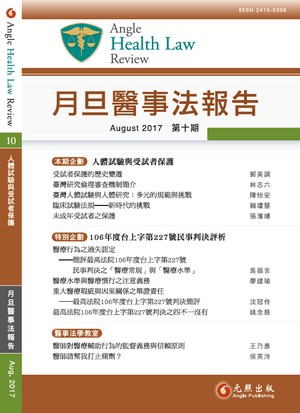臺灣人體試驗與人體研究:多元的規範與挑戰【本期企劃】 試閱
Protecting Human Research Subjects in Taiwan—Regulatory and Nonregulatory Approaches and Challenges
人體研究法規定的事前審查機制─對個別研究案的研究倫理審查,旨在保護研究對象,應無過度限制研究自由的疑慮。在人體上作試驗研究,不屬於研究者個人的言論自由所及,自不適用言論自由的事前審查禁止原則。實務上,人體研究受到多元的規範,包括臺灣與國際的研究倫理原則、主管機關的行政指導、外國法的規範、研究經費補助機關或贊助者的規定、研究結果出版期刊的規範等,且各種規範之間會有重疊與流動的情形。此狀況值得主管機關關注並善加利用,可避免倉促地立法制定剛性規範,過度限制研究自由,影響生醫研究的發展。
The ethic review stipulated in Taiwan’s Human Subject Research Act (2011) is to protect the rights and welfare of research subjects and not to overly and unconstitutionally restrict the freedom of research. The whole picture of requirements ruling research involving human subjects includes not only statutes and regulations, but also ethic guidelines, governmental guidance, requirements by funding agencies, sponsors and publishers. These various sets of rules may overlap each other in some way or the other. In many cases, ethic guidelines were later made into statutes. The regulator of human research and congress should aware of the various measures to govern research and take advantage of those more gentle approaches to avoid hasty enactment of new law.
029-043






